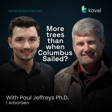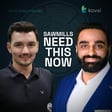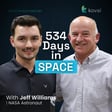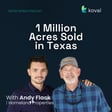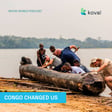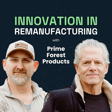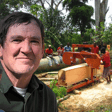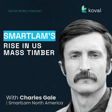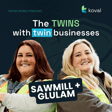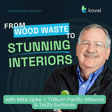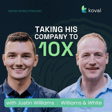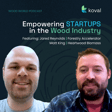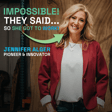Introduction of Tyler and Kyle Freras
00:00:00
Speaker
Today we're joined by Tyler and Kyle Freras, the twin brothers leading Freras Engineered Wood.
Journey to Leadership at Freras Engineered Wood
00:00:05
Speaker
They'll share their journey from childhood days running around the mill to becoming key leaders in their family business.
Evolution from Lumber to Engineered Wood
00:00:11
Speaker
We'll explore how their company evolved from traditional lumber manufacturing. We originally started out as a lumber manufacturer back in the 1920s to creating innovative engineered wood products like mass timber panels. we We went from lumber manufacturing and then we converted over to veneer manufacturing and that's really been our our specialty ever since.
Advancements in Wood Technology
00:00:31
Speaker
We'll discuss how these advancements are allowing wood to replace steel and concrete in amazing projects. And we are building bigger structures at much higher quality. We're just seeing the very beginning of building just some amazing structures with wood.
Career Opportunities in Wood Products Industry
00:00:44
Speaker
And touch on future opportunities for younger generations in the wood products industry. The opportunities for kids these days are legion and ah in our industry and I think it could be a situation where they can find a career without a load of student debt.
Official Podcast Welcome
00:01:01
Speaker
So welcome to the Wood World Podcast.
Roles and Responsibilities at Freras Engineered Wood
00:01:03
Speaker
We have Jessica Johnson as our co-host from COBOL. And with that, we'd love to get um Tyler. Can we start with you, please? A little 30 second introduction. who Who is Tyler? And from then we can switch over to Kyle, please. ah Sure. My name is Tyler Ferreras. I'm VP of Sales here at Ferris Engineer Wood.
Collaborative Working Relationship and Sibling Dynamics
00:01:27
Speaker
um Typically oversee most of our product sales that we have throughout the company. Thank you.
00:01:38
Speaker
Um, my name is Kyle first. I'm vice president of operations at Ferris. Uh, we try to keep our responsibility somewhat stepper. So we aren't stepping on each other's toes, but frankly, we work together every day. So we don't do a lot of stepping on it on each other's toes. Uh, we actually work pretty darn well together. Uh, I've been back of the company since 2001 after a brief stint in the, uh, in the tech industry. Very
Family Dynamics Q&A
00:02:05
Speaker
cool. I have to know. Cause I have identical twin boys and I know which one's first and which one second. So who is oldest? I have that honor by, and and by about 10 minutes. So I always give dollar a time is about 10, 10 minutes more of wisdom, but I'm not sure it really counts for much.
00:02:27
Speaker
Oh, I constantly am like, go find your little brother and little brother pipes up and says, it's 21 minutes. So I get it. But, um, I just, from my own curiosity, um, I did this with Casey and Kelsey too. I was like, who's, who's, who's number one and who's number two? Cause there's always, um, an interesting idea for that.
Comprehensive Involvement in Wood Industry
00:02:49
Speaker
Totally guys. Well, to kick it off, um, we named the podcast, the wood world podcast. And so we cover many companies, many organizations, great teams, great individuals who do a whole wide range of things inside of what we call the wood world. Could you, Tyler, please explain where does Ferreras fit into the wood world?
Range and Applications of Wood Products
00:03:17
Speaker
Well, so we ah we essentially make almost all the products products so we that we can from a tree. So we handle from the the primary logging contracts as we buy timber sales from the state, ah federal operators, as well as private timber holders. And then we ah we process veneer as our primary products. So veneer being the thinner pieces of wood that comes off of the lathe. And so we have two veneer plants. We have a dry veneer merchandising facility. We have a stud mill. We have a cogen plant where we're producing electricity off of wood waste. We have our our plywood and panel operations. And then we also have our mass timber facility.
Freras' History and Evolution
00:03:59
Speaker
um But even within those products, we also have all of our residual stream as well, where we're producing, you know, sawdust, chips, shavings, and ah but also material like biochar from that residual product from our CoGen facility and obviously electricity from that plant.
00:04:20
Speaker
And they to to kind of add to that and flesh out some some history, we we originally started out as a lumber manufacturer back in the 1920s. In fact, we celebrated our 100th anniversary ah here a couple of years ago and something we were really, really proud of. ah The company was started by our grandfather, T.G. Ferris, and back then it was the days of the of horses doing the logging and the mill sites being up, up in the trees because it was easier to take the mill to the trees and the trees to the mill. So things have changed a lot of the years. We we went from lumber manufacturing ah until say the late forties, and then we couldn't convert it over to veneer manufacturing. And that's really been our, our specialty every so ever since. But we've had to innovate a lot along the way from lumber to veneer.
00:05:11
Speaker
to Metrogard Veneer to support the LVL markets, and then to panel manufacturing and in the late nineties. And then like Talia said, our co-generation facilities. And then finally, the last big investment we've done is in our engineered wood facility in 2016 and 17.
Returning to Family Business and Facing Challenges
00:05:33
Speaker
Yeah. Anything you're curious about?
00:05:37
Speaker
So can you talk me through the history of you guys kind of, I mean, how you said you came from the tech industry, right? So coming into a family business is never easy. How did you decide to make the decision to go into it? And what has, how has it shaped your career?
00:06:00
Speaker
So i I think I always anticipated coming back to the family business. ah Tyler actually came back a couple of years before before I did because i I wanted to get some experience at another company for a while. So I kind of rode that in that dot com i era for a bit until September 11th, actually, when I was kind of stuck in Boston for a couple of weeks after the World Trade Center
00:06:25
Speaker
disaster. And that really changed my mind about traveling and working in the tech industry. And it happened to be that it was a convenient time to come back and insert myself into the family business. But we've always cared, I think, deeply about that are our our family heritage and and legacy, and what our Our grandfather started back in
Overcoming Market Collapse and Building Resilience
00:06:46
Speaker
the twenties. It's something that we've always respected and want to be a part of, but it's daunting as well. Like you said, and when when we, when we first came back, our management team, uh, which and at the time included our father, our uncle, and our cousin had over a hundred years of experience. So we jumping into a business with a, a management team of that weight was, was not easy.
00:07:11
Speaker
Okay, so Tyler, what was your path back home to lions? Well, I was actually a little bit more direct. i You know, ah and I both went to school down in Southern Methodist University in Dallas, Texas. um I chose a business and finance path ah for my college degree with the intent that I want to come back and work with the business. So I pretty much worked here every summer that I could since high school and tried to get a broad feel for all the different positions around. um You know, Collinite really did grow up at these facilities. We would come with our father and his El Camino back in the day and just run around the bone yard is what we call it, but essentially all the equipment that's been pulled out, all the rusty pieces of stuff you you could and ran through all the facilities while they were shut down on the weekends. And so we we really spent a lot of our youth, you know, tied up with with these facilities and had a real intensive love for it. so
00:08:09
Speaker
you Anyway, I came back and right around 1998 and started in 1999. Like with any other family business, you start getting all the grunt work that no one really wants to do, but that's how you kind of learn about all the other portions of the business. Um, so yeah it's, it's been an interesting, but to Kyle's point, a family business isn't easy. They, they expect a lot of you. They expect, uh, and you end up putting a lot of expectations on yourself too. So the, uh, you're always trying to perform in a family business because it it means so much for everyone that's involved. We we always say yeah you you can't, you can't avoid your shareholders in a family business. You end up seeing them at every family party and every picnic. So.
Lessons from Tough Times in Wood Industry
00:08:56
Speaker
Yeah, that must make Christmas a little tense, maybe. I'd love to know, I mean, not everything is always rosy. And so as you both kind of grew up and came to today, I mean, what were some of those can you share one, maybe one challenge each as an example of something that you overcame personally, as you kind of grew up and then now you're thriving in the in the business, but kind of those challenges and if you could reflect back to your younger years or I guess just as you were learning and growing through the organization um you said you know you had to do the grunt work and what what does that teach a young person and how does that shape you your character to allow you to be who you are today? Tyler you better take that one first that's a big question.
00:09:47
Speaker
Well, I think one of the things I really learned from from ah some of the starting positions that I did, whether or not it was a green veneer off-bearing or um working the catch shop or logging or any ah of the other Short-term jobs I had is that you know that that our hourly work takes a lot of effort and and it's and they're all necessary required positions and that you've got to take those seriously and be able to work hard and and do the heavy lifting in order to to
00:10:20
Speaker
stick around and actually become a value. I think one of the most forming experiences I think that we had was the 2008 and 2010 market collapse. I mean, during that period of time, you know the housing market collapsed from 1.7 million housing starts down to 400,000 or 300,000. It was really difficult to find any type of marketplace or market condition that we could actually operate in.
Market Downturns and Current Strategies
00:10:48
Speaker
And, um, pretty much every wood products producer was out there just trying to keep their, their mills operating and, and motor and trying to go through the decision-making process of how do we operate in a, in a market that just suddenly went down to 20% of its typical operations and not lose that much money. And, uh, so to me, that was a trial by fire. Um, and not something I'd look forward to going through again.
00:11:15
Speaker
Okay. Wait, hold on. I want to, I want to bump in real fast because you brought up something that I was curious about and that is the lack of housing start at a level that we have been used to. There's a serious lag. Everyone's talking about the economy. Most people can't afford a house now with interest rates where they are having survived that. Do you think that that challenge and those learnings are going to be applicable here looking down the pike of the rest of 2020 or and into 2025?
Current Housing Market Issues and Regulatory Impact
00:11:44
Speaker
Well, I think there's capacity within the wood products market to produce and enough materials for a 1.8 million, 1.9 million housing starts. I don't think it's an industry problem in order to to produce the materials for these homes.
Wood Products in Affordable Housing and Sustainability
00:12:01
Speaker
To me, it's it's a little bit more of a political problem. A lot of the costs that go into you know building homes, whether it's ah it could be zoning issues as far as available land being available or i essentially system development charges. you know By some estimates, we're hearing that about 35 to 40% of the cost of a new home is actually just due to regulatory fees. So if we really want to make housing more affordable, I i think the government needs to figure out a way to be more efficient was with ah how they put available land and developments out to the consumer.
Large-Scale Projects and Personal Challenges
00:12:37
Speaker
Sorry, I didn't put you off, Kyle.
00:12:40
Speaker
No, to, to, to your point, uh, you know, 2008 was, was a formative time and we, uh, that was a little, that was earlier in our, in our careers and dealing with a yeah a market collapse like that was very educational experience. Now that said, no, and when I was mentioning that, uh, our executive team had over a hundred years of experience. I mean, I'm serious about that. Our, our uncle, uh, had been working through the, through the depression. And I feel like one thing that we've gained from working with him over the years is, the and but whether this, you know, good or not, but is the feeling that ah things will always change and that the there's always another shoe to drop. So I would say that even when times are good, we we typically have this feeling of,
00:13:35
Speaker
This is going to change and we're going to have to deal with some, some bad times later on. So, uh, I don't want to say that we, we, we managed by pestinism, pessimism necessarily, but I do think that we are certainly, uh, always trying to to prepare for, for the lean times. Do you want to address a challenge other than, um, the lean times that are coming or year? Well, I would say some some challenges that that have been formative for me are really smooth some of the big projects we've tackled had tackled over the years that have been formative in in the company. and
00:14:15
Speaker
The first big one I was really involved in was the co-generation plan back in 2006 and 2007. And seven and ah it's just those those experiences when when you really have to push hard to get a large scale project finished in an area that you don't necessarily have experienced in, so those those can be very educational allowed moments. So I learned a lot through that that project. I think we all did as we we were trying to ah basically write the proforma, you know, the the business plan for that particular piece of piece of our organization. And ah frankly, when we when we built the ah the mass supply panel facility back in 2016 and 17,
00:14:59
Speaker
ah It was right around the same time that that the president of our company, our mark father became became ill. So trying to put in a $35 million dollars facility at the same time that you're dealing with some of those family issues was was a challenging time, but ultimately successful.
Passion for Wood's Versatility and Innovation
00:15:18
Speaker
Kyle, Tyler, it it sounds like from your story, and thank you for sharing those deeper stories kind of that come from the heart. I guess when we face challenges in our human nature, you could either give up and exit and throw in the towel or persevere and get through it and push through it. So you know because you're here today, you didn't throw in the towel. And why are you individually, again, if we maybe start with Kyle first this time, but
00:15:47
Speaker
Kyle, why are you a part of the wood world? Like why, why wood for you?
00:15:56
Speaker
for For me, wood solves a lot of our societal issues. I really believe it it is the win-win solution for for a lot of our our problems today. I think on the ecological or environmental front, I i think forest management is the solution to ah the wildfire issues we've been having. a It it is can help to address climate change issues if people are concerned about. I think the this idea that we ah will always have a negative effect on the environment is mistaken, and that's something I feel pretty passionate about, that and that I really try to communicate to people. and
00:16:36
Speaker
we We really can't have a beneficial effect ah on the environment at the same time that we're producing sustainable materials for the economy, generating jobs for rural communities that have really suffered in the past. um And I just, I think there's a big story to hear to tell about by the positive benefits of the wood products industry on the environment and our society. I love that. Let's come back to that and unpack. That's a really big topic and I would love to jump head deep into that as well. But Tyler, can we hear from you first? Yeah, you know I think one of the things that I absolutely love about wood is that yeah we are able to do so much with it as a material. And there's so many consumer items that are produced out of it. But you know i I've been in the business now for 25 years. And I'm still always learning something else about manufacturing with and some other products that people are making.
00:17:34
Speaker
And looking back at our development of the mass flight panel, which is really a unique product to the market at that period of time, even while cross-limit timber was just a new product on the market, ah there were some significant hurdles in actually developing this type of product. It didn't come easy. We had some serious speed bumps. and and and some hurdles, but I mean frankly the general concept worked out and it was a really fun process in order to try and figure out how to make new things with wood and and and specifically make a new configuration of product using all the different ah plant processes that we've had in place for the last 50 years.
00:18:16
Speaker
So, um yeah, wood is good. It's a fantastic material to to work with. It's a fantastic material to build with. And we are building bigger structures at much higher quality than people
Ecological and Societal Benefits of Wood Industry
00:18:29
Speaker
have in the past. And I think it's it's ah we're just seeing the very beginning of this opportunity to build just amazing structures with wood. That's fantastic. I. You know, can't thank you both enough for doing what you're doing because you directly are um manufacturing and and producing these amazing wood products and innovating. ah Innovation is definitely something that looking from the outside at your brand, your people, seeing you guys at trade shows, innovation is definitely a word that I would say describes you as an outsider looking in. But we've come back to the innovation bit back as well. I mean, could we go back to Kyle? You talked about
00:19:08
Speaker
There's a really big story you said here to tell about the positive benefits of the wood products industry as a whole, really on you said environment, society. I mean, and there's a big negative connotation. Can we unpack that a little bit? what What do you mean? What is the negative and what's the true story here?
Environmental Advantages and Sustainability
00:19:25
Speaker
Because you guys are boots on the ground doing it.
00:19:30
Speaker
I think people have have always looked at human activity out in the forest in particular and it just assumed that that is it's a zero-sum game. That if you're you're basically taking material out of the forest that you're somehow doing doing harm. And i I just don't believe that that's true. And in fact, i and I think what we've seen over the last 30 years, particularly and in the Pacific Northwest, is that lack of human activity out in the woods has really generated and the the conditions for some pretty drastic ah forest fires that affect not only the environment and
00:20:08
Speaker
the the animals out in the environment, but also our local communities, which are really susceptible to wildfires as well. i There was a significant human tragedy in our area back in 2020. during the Labor Day fires where over 700 homes burnt and many families were displaced for years. And frankly, and yeah it's something that that left a significant mark on that community that's that's still here today. So this if if we can really yeah inform people that we we can make a positive impact on the forest, reduce forest fires, to generate
00:20:51
Speaker
ah products that generate economic activity and to make a lot of the stewardship and rehabilitation projects worthwhile. I mean, I really think it is a win-win situation for for the environment and for for us as a yes society. And the only thing I also wanted to um mention As far as the innovation, we we have always had a tremendous respect for the the wood fiber that we use to generate our products with, and we always strive to do more with less. and I look at the history of our company and frankly, a lot of wood products companies, and it's really the same way. You start out with, but say, say it a log cabin, and then people move to lumber manufacturing, and then all of a sudden a new product comes out like
00:21:36
Speaker
like plywood where you're generating veneer with a higher recovery than lemur mills can see and that can use a smaller diameter timber. Then all of a sudden you're generating engineer wood products with specific engineered properties where people can design large structures from them. And then finally the the mass timber evolution as well where Not only then are we using less material to to ah generate enormous structures, but you're actually substituting for products like concrete and steel, which have a much higher environmental impact than than wood products. So that that innovation portion has been built into our industry for for over a hundred years. And I'm i'm just excited to see all the products that people have developed these days out of wood. product that it out of wood
00:22:25
Speaker
Could you, I was going to ask if you or could, Tyler or Kyle, if you could, you know, we're, we're talking about innovation and you've mentioned a couple of different products and things you guys create, but can we kind of go, can, can one of you guys walk us through what are all the different types of products that your company, you know, creates or develops or produces today and brings to market? And then answer the question for each one. What's the main application for that? If it's lumber, it's homes, or sort of like that. Just kind of curious, what's the wood product that you create or manufacture, and then what's its main use or uses? Okay, well, you know, when we pull the a tree into the log yard, we will use the bark in order to create beauty bark, but we'll also take some of it into hog it into hog fuel to power our cogent plant.
00:23:23
Speaker
um So there's our two, then we go into chips, which is a residual product that's the the leftover material after you you peel um what you can into usable product. Veneer is our primary product by volume. It's the highest volume product that we make. We typically sell that to almost any other West Coast um manufacturing facility, whether they're producing plywood or LZL. LVL being laminated veneer lumber, specifically wood beams for um say housing for headers and beams. ah So that's a great market for us. It takes a high quality veneer that's density graded. So um our second highest volume is that density graded veneer.
00:24:09
Speaker
um Then we typically ah in the past we've made a ah lot of just commodity grade plywood panels. So this would be CDX grade that goes goes into housing starts for your floor, your walls, and your roof for a typical home. um But now we're also qualified to make LVL as well or structural composite lumber in which we use the density density graded wood in order to make the building blocks and components to our mass timber facility. So while while now ah the master portion really only accounts for say 10 to 15 percent of our overall volume, it's been growing every year. And it's ah obviously it's a niche that we're specifically involved in that most people aren't in the wood products industry. And so we're looking to make that portion grow as much as we can going forward.
00:24:58
Speaker
And mass timber, for those who don't know, what is mass timber? And I know it's like a big buzzword right now and we went to the big mass timber conference. What is mass timber? What does that mean for you guys? What portion do you play in the mass timber space? Can you unpack it? Yeah, so we've essentially patented our own uh, type of cross laminated timber and that's veneer based or engineer veneer based so If you look at it, you would think that it's it's a very large format plywood panel the third essentially make ah a panel that's that's up to 12 inches thick 12 feet wide and 48 feet long yes essentially download the designs for an overall structure or building that people want built out of wood
00:25:44
Speaker
and We will create every structural element to that building from the building blocks that we put into the plant. We can make the beams, the columns, the floors, the roof, the walls. yes Any portion of the structure that people want pre prefabricated will make. and so yeah the The really cool thing about it is ah we put it on these very large format CNC machines. And we pre-cut the panels so it turns into a unique panel for unique buildings somewhere in the universe. And ah so it's ah it's a very specialized part at that point where we've already cut in all the electrical, the plumbing, the mechanical, everything that they they need in order to make a typical structure is all going to be pre-designed and pre-cut into the panels prior to prior to delivery.
00:26:29
Speaker
So on that, ah our columns are actually even even thicker than that. I mean, our panels can get up to 12 inches thick, but our columns, we can lay up to 24 inches thick. So imagine a ah column that's 24 inches thick by 48 inches wide and 40 feet long. That's really the the extent of our manufacturing capabilities right now. but Yeah. You think about an old growth tree that could have been that size and really we're doing the same type of products, but with small diameter timber. In fact, the, the veneer that goes into that product, uh, the, the average diameter of those blocks going into that are about nine and a half inches. So we can then make extremely large wood elements at a very small trees. You call would define what you mean by blocks.
00:27:18
Speaker
So when we receive logs to the mill, a log is typically cut into, say, at 34 or 40 foot length. And then well we'll block that log out. So we'll we'll break it into eight foot sections. And each eight foot foot section, we consider a block. So if you think about a tree standing up, of course, you're going to have be thicker at the base. Yeah. And then you're gonna have this significant amount of of taper up to the top of the tree. Well, each, each log ah will separate in our, in our log yard or out in the landing where anything less than say about 13 or 14 inches is going to go to our small log plant, which really specializes in, in those MetroGuard density graded veneers that go into our engineered wood products. So the average name of those blocks is about nine and a half inches. Thank you.
00:28:09
Speaker
Whose idea was MPP?
00:28:14
Speaker
but I would say it's it's really ours. Kyle and I traveled to Europe back in 2015 in order to see exactly what this new thing was called cross-limited timber. and Frankly, I think we're just audacious enough to come back and think we can do it better than they were doing over in Europe. so We just immediately immediately went to work on developing the processes in which we could make ours our um material out of what we had available, which was veneer. And with working with Oregon State University at the time, we took some test panels down, proved that we could surpass the capacities and the the design values of cross laminated timber. And once you do that, and once we had the patent, it was kind of like, well, we either got a fish or cut bait and, you know,
00:29:00
Speaker
either invest in a facility or or let it drop. and Luckily, we were able to convince all our shareholders and had a lot of support from our father of that period of time in order to push through on on a product that no one had even tried before. so it's It's been a unique experience from that standpoint. and That's wild. I will say that if, if we were sitting in a period of time where our veneer sales were just moving fast and our plywood sales were, were, were off the charts, we probably wouldn't have considered it, but and adversity kind of forces, forces you to innovate. And we were at a period of time where we have in, uh, difficulties moving our MetroGuard veneer, our density graded veneer.
00:29:42
Speaker
So, uh, did Tyler mention i an and bit that he specifically said, Hey, wouldn't it be great if we found a product that could use a lot of our density graded full, uh, full sheet veneer into a higher value product? And that's really what the, the, the nexus or this, the start of the entire conversation. And then, uh, the trip to Europe. that really allowed us to wrap our heads around the fact that you you can afford to use more wood in a panel like this, not because you're but competing with stick frame construction in a residential market, but because you're competing with concrete and steel in large buildings. And that and that was really a a light bulb that went off that really said, hey, this this really does make sense. This is and a market that we can tackle. When you say compete, why do you position it that way?
00:30:33
Speaker
Well, because said at the end of the day, developers are going to be looking at cost of product in construction. and There's always been this idea that wood is going to cost more in construction than concrete and steel, but really the fact is is that people are just used to working in concrete and steel. so ah As time has gone on and there's been more case studies and things like that, I think we have been able to show that our product is cost competitive with concrete and steel and has all those additional other environmental benefits that that haven't made sense. so you know what We are competing with other products on on these these projects and ah we have to be competitive. Yeah.
00:31:19
Speaker
But it feels a whole lot better to compete with the concrete and steel manufacturers than and to be cannibalizing market share from other wood products got and customer or companies. What are you most proud of in terms of MPP projects or case, cases, um things that you've proven within that space? Or even more like, can you share some examples of beautiful projects? Or yeah, like, can you share more about deployed MPP Yeah, that we can I mean that there's actually been some very very cool projects that that are are going to be ah Become more available soon. Number one is the portland airport The pdx airport they completely replaced the t core the terminal core roof with partly our product but also products from zippo laminators and some other force products companies and you know, we've been essentially delivering on that project for three years and
00:32:17
Speaker
it's still not open to the public. So that will become open in August and I can't wait for everyone to really get a look at what a fantastic amazing structure this is. We did some really innovative stuff with wood on this one where ZGF, the principal architect, um just asked if we could come up with ways to do say large sweeps out of engineered wood And so, um yeah, we we really went to the drawing board and and came up with some very interesting ah solutions for the some of the products we're looking for. um A couple other ones that are really neat, we just finished our first 19-story structure down in um Oakland, California with a company called Oh Wow! Extraordinary customers to work with, great great developers, but yeah we ah ended up being able to put up a yeah
00:33:07
Speaker
to provide material for a project that went up in less than four months structurally for a 19 story mass timber structure. So that was pretty extraordinary as well. ah One that I had in person, but I'm looking forward to is the coronation arena up in Edmonton. We essentially provided visual grade panels for an entire roof assembly for a um ah an arena up in Edmonton. So it's that's a beautiful structure as well. I've only seen pictures though.
00:33:35
Speaker
Thank you for sharing Kyle any others that strike you Or maybe let's see the oh wow building that in Oakland, California ah just because that's a ah particular design called the point supporters lab that I think our our product really ah performs well in and that coronation area in arena one thing I like about that is that those panels that we provided to ah to that project are two inch panels. So that's a panel thickness that that most CLT manufacturers can't hit. Most of them are limited to thicker panels than two inches. So I think that those two inch ah products have been been very good for us. We can get out a lot of surface area with the far less volume than then then other manufacturers.
00:34:28
Speaker
Thanks for sharing. Guys, not to really take it to a whole other level of conversation, but I'm kind of curious to switch it up and go personal on you for a little bit as Jessica, you prepare the next series of questions. But guys, I remember the both of you a couple of years back and, um, it was at the mass timber conference in Portland, Oregon. And I remember walking around with a camera, taking pictures here and there. And I remember you all with your families and your wives showed up at the show. And I think you built that one observation deck, was it? up Upstairs. And I just saw how incredibly proud both of you were that your families were there with you. And um I frankly was really enjoying playing ping pong at your ah your booth there where I met one of your family members who also was in charge of, you know, one of the leaders of your organization.
00:35:21
Speaker
and And you guys both brought your children and your wives, and I'm sure I have three children and myself and I'm married. and um Can you share some of that really personal insider, kind of like your feelings about this industry? And again, we we heard why you're passionate about it, but now Is there a future here for your children to grow into the family business? What's the future of the wood? Is there opportunity to continue innovating? How do you see, like, give us some insight to, yes, there's challenges and there's adversity. I love Kyle, how you said, we grow through the adversary, adversity. t And so you both have children and families and I'm sure you want to leave a legacy. So what does that look like? What's the future look like for you?
00:36:11
Speaker
Well, you know I've got two boys, one that's almost 18 and one that's so almost 16. um and you know Frankly, I look back at at how rewarding this industry has been to me, and I would say that I'd love for them to have the same type of opportunity that that I have had it in in the past to be able to work with phenomenal people and to learn a lot. But what I think k I both tell our children is is that the number one thing that you have to solve when you come to work for a family business is that you must be competent. You got to be a hard worker. You've got it. You've got to be smart. and You've got to actually add value to the organization that you're working for.
00:36:52
Speaker
um even more so with the family business because there's a lot of people looking at you to to continue things on. So I think our goal would be that this is ah a business that not only lasts 100 years but can last 200 years. wow We intend to be the last people standing. if If Oregon decides that wood products are no longer ah where it wants to go, we in really intend to turn out the lights. We we don't don't want to be the first person in the arts here. We want to fight the battle to make sure that people know that we're doing good things in the forest and we're creating good products out of wood and that we're where's here to stick up for the rural communities in Oregon for the long term. Thank you for sharing, Tyler.
00:37:36
Speaker
So it's it's been a fantastic experience at that Mass Hamer Conference to be able to bring our our families. And that number one, they' they've been there since we first band began going to the conference. So we have pictures each year. And it's amazing to see how not only have have our products around, our kids have grown grown even faster. ah Until now, we have a couple leaving for for college. they No, they they went from throwing balls around the mat, stemmer conferencing, wrecking havoc to leaving for college over the period of time that we would working on these these products, which is pretty and pretty amazing. Yeah. No, and ultimately what it comes down to is we we are a family business and we we intend to stay a family business. And the the only way we can do that is by making sure that like that
00:38:28
Speaker
There's opportunities for for family to be involved. And like Tyler said, and it's it's incumbent on us to to make sure that we instill one of the next generation that that this isn't a gift to be taken lightly if they're interested in working for the business, that they really have to put in the time and effort and they have to be competent. And that's that's really important to us. Because it's not only us relying on that, it's the other yeah other shareholders and other family members that that you have to look in the in the eye of the end of the day. And while we're on the topic, um go broader. Just young people, you know, going through middle school, high school, college, are there opportunities in the wood products industry and what advice do you have for younger generation? You know, it's still potentially looked down upon the wood industry or killing trees or clear cutting, all these negative terms. But are there opportunities in the wood world as you see it and going into the future, not just for your own kids,
00:39:28
Speaker
But as the younger the next generation grows up, what are those opportunities? can you Can you explain some of that? Well, I think that the range of abilities that our industry requires to to be successful is just and amazing from from not only ah the logging and cutting side of the ah the operations, but but we We employ diesel mechanics, we employ mill rights, we employ electricians, ah foresters, cruisers, office staff. Really, it takes a ah wide variety of skills to keep this operation going. We're big proponents of of trade schools. we We support the local trade schools. where
00:40:10
Speaker
We're intimately involved with with them. ah We think there's a tremendous opportunity for kids these days to be be able to, especially kids who might not be interested in college, to go directly into into careers. And what we will actually fund education for, for areas that kids might be interested in and learning more, whether it's, uh, like I said, being an electrician or a mill writer or anything else. So if the, the opportunities for kids these days are legion in our, in our industry. And I, I think it could be a situation where they, uh, they can find a career without you having to go to college and to end up with a mill load of student debt at the beginning of their, of their, of their life, of their career life.
00:40:54
Speaker
I would actually add to that if I just could real quick, is that you know the technology is changing so much. i mean We are implementing robots on on a wide scale throughout our facilities, but even out in the woods, the harvesters and forwarders are i mean largely taking a lot of the heavy lifting away from you know what is really one of the most dangerous jobs on earth, being a logger. So that's becoming much safer as well. And so the the opportunity to use technology to make these jobs a lot more attractive is there, and it's coming. And we we intend to be on on the forefront of that. um As far as what kids can do, I mean, I don't think kids or or people realize how and important every employee is to a company.
00:41:36
Speaker
what what they can do is really make themselves essential. Show up, come to work, be early, don't do drugs, don't do stupid things. you know And at that point, companies just end up relying on you to such a degree that they feel your absence when you're gone. And that's exactly the sort sort of scenario where you you really want these kids to understand that that we need you, but you gotta be there and be make yourself dependable. And I think they can turn into a valuable person at almost any company.
00:42:08
Speaker
Y'all are pretty well known within the industry for your outreach within the community from the Ferreira's family classroom to supporting probably everything under the sun and lions. Can you speak to how important that is, not only to the company, but as y'all as individuals, especially with children, um you know, little eyes see everything. Well, our our grandfather was pretty visionary and set up a the foundation decades ago, I think in back in the 1970s. That foundation ah still exists today and we donate about $200,000 a year to primarily local causes. and we We really try to try to keep the money local because it's really the the community that has supported us to over the years.
00:42:58
Speaker
they're they're the the employees that and that keep our plants running. They're our customers. They're our ardent supporters. So we we care a lot about making sure that we're supporting the ah community that's supporting us. and I think it's really interesting. We you found an old time card of our grandfathers from back in the 20s. And it's really interesting interesting to see that a lot of the names on that time card are names that we're from familiar with today. So a lot of the families in the area and have been around for 100 years and have been a part of of ah of the company since since its founding.
00:43:36
Speaker
Guys, I have another curve ball for you, Tyler, without much thinking and deep thought here. If you could snap your fingers and solve one of the biggest issues that's in your roadblock for you, in your path right now, what would that be? And it's solved tomorrow. And same thing for you, Kyle. I really wish that people could yeah download our perspective on forest management and all allll be the benefits that Wood Products provides all the way up and up and down the the entire value stream from safe, healthy, resilient forests to strong, vibrant, prosper prosperous rural communities to um you know the the truly extraordinary buildings of the future.
00:44:17
Speaker
mean Really, we just need to have a um we need to have a closer touch with the products we use and can consume on it on a daily basis. We should look at our buildings from a forest to frame, and we should look at at our forests as the gardens that we need to attend for the future. Wow. And Kyle, I wish I had a different answer than that, but really the, the, the reliability of, of timber supply is the biggest issue we face today. There's a lot of, a lot of the other issues we we can tackle. I mean, we've, we've dealt with, with roadblocks and our, and speed bumps in our production. We've dealt with the manufacturing issues. We've dealt with sales issues. Uh, we're used to dealing with those issues, the ah political, those political issues that that really touch our forest and
00:45:05
Speaker
and that how we interact with them are very important, and those are those are harder to to communicate and fix.
00:45:14
Speaker
I usually don't do this and our team might want to cut this portion out, but I mean, our mission at Koval is exactly that. It's to improve the lives of the people in the wood industry globally. And the issues that you guys have to just describe, like are really near and dear to our heart and why Koval exists. And that's what we do. If you could give us some advice, what could we do more or How do we reach more people on your behalf, on industry's behalf to really, I love that phrase you guys use is, I wish people could download our perspective. How can we at COBOL, how do we get that download to people's perspectives in your community, in your state, in the United States? And really in our mission statement, it says to improve the lives of the people in the wood industry globally.
00:46:11
Speaker
I think it's a great question. i I think you're on the start to it just by having these types of podcasts and allowing people to give a little bit of a perspective on as far as where they're coming from. ah you know there's There's too much of a tendency out there to to paint people in the timber industry as evil as opposed to the stewards of our future resources, and I think it's these types of conversations that will Well, hopefully open people's people's minds in the future and maybe highlighting some of the amazing structures that are being built out there I mean when you guys get the opportunity to take some video at the Portland Airport, you know, I can't wait to see your podcast again Thank you. Let's do that So did see Todd I gave an interview but uh at one point to just in semi and at the end of the interview they were talking about the fact that uh, and this is this is a young person uh far younger than than we are and about how all the news that they hear is negative, that they wouldn't be surprised if the world ended 10 years from now, do all these catastrophic environmental issues. And really, I think the message that we like to share is there's a lot of optimism out there that technology
00:47:24
Speaker
Uh, is can be a solution to a lot of our environmental issues. And this isn't necessarily rocket science. We don't have to invent a new product. In fact, mother nature has provided one of the most sustainable products for us out there. And we're fighting new and and innovative ways to use it to make, make the world a better place. And God willing, we're, we're still going to be around 10 years from now, 20 years from now and a hundred, a hundred years from now. Uh. and the that the world would will actually be a ah cleaner, a more sustainable um place and it is than it is today even. Particularly in and for our youth today, I think they've they've really been told by the as to the UN n Climate and Council that you know really the world might end 10 years from now.
00:48:08
Speaker
And that would be a very depressing way to to be entering your 20s and 30s to believe in that you really didn't have any opportunity. yeah And i I just think that that's a terrible thing to instill in our youth. Totally. Guys, I think what you're touching on, and one of you just mentioned the word that I love. is subdue or I think ah somebody just said steward that terminology. I believe that comes from ah the Bible and if we look at Genesis chapter 1 verse 28, God commands us to fill the earth and it says subdue it and have dominion over it.
00:48:49
Speaker
And i I love the fact that like you're absolutely actually doing that very practically and living that out and like making a really big and positive impact for your community. and then wherever your materials go and wherever they're used, you're making a ah beautiful impact. And I think there's really what I love about our industry, your story, there isn't something that we got together and we agreed to before the podcast session and be like, don't go into this dark corner of our our our our of our business. Like, no, I think that's one of the coolest things here is we don't have anything to hide. Like you probably have a whole bunch of people touring your facilities and
00:49:27
Speaker
you're proud to show that it's, you know, every piece that comes into the logs, the the the tree, the wood products that come in and out of your facility that there isn't any waste and it all gets used. And I think we're all super proud of that. I'd love to amplify your story and what you're doing to steward your resources. Well, we appreciate that very, very much. I mean, I think it's the best story that we care care about deeply. Absolutely. Guys, if any last thoughts, comments, if if you could have the microphone right now and speak to just the whole world or a large volume of people you want to reach, what would you tell them in one sentence? Give us that punchline. Each of you go.
00:50:15
Speaker
but i tell her I was gonna take more time to think about that. All right Well, I'll jump in and say what we really the the construction of our mass applied panel facility is it's kind of been the start but I think you're you're you're gonna see some amazing things going forward as well I mean this this one step to create a new patented product is really forcing that and the challenges of our day which are labor issues, cost issues, environmental issues. Those are all forcing changes in our organization that we're trying to hit head on. We're spending a lot of money on research and development, and I think we'll see some dramatic changes in what products technology over the next five years. So I'm excited to see what this one step in an innovative new product is going to do for the rest of our organization. I love it. It's a huge sentence, but thank you.
00:51:11
Speaker
Yeah, i'm i'm looking forward to expanding the types of buildings that we're involved in and I I see a ton of promise in uh in modular going forward Okay, we can produce housing at scale at a much faster scale than it than it has ever been produced. Well much more quality structure Um, and so it alleviates some of the the housing difficulties, but also some of the disaster mitigation out there so I I think that We need we need to have partners that are thinking outside the box as far as how they build the buildings in the future and we're happy to provide the materials for it. I love it. that our Our customers can be be our our biggest innovators. There's some people that that are ah really trying to develop products out of mass timber that can compete with ah but the light wood framing and residential markets and i'd and I'd love to see that develop.
00:52:01
Speaker
I love it. Gentlemen, it is the top of the hour and I'd love to say thank you to the both of you for your time, willingness, and passion for this industry, willingness to come onto this podcast and share your stories. I know you gotta run, so thank you so much for your time.

